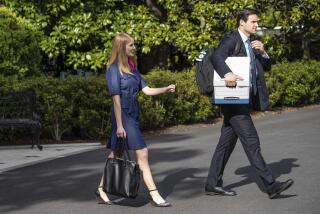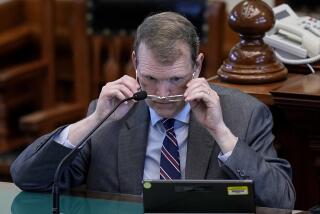Deaver Aide Backs Alcoholism Defense
- Share via
WASHINGTON — A secretary to former White House aide Michael K. Deaver said Thursday that her former boss was often forgetful and moody in the two years she worked for him, testimony that appeared to support the defense contention that alcoholism was responsible for his faulty memory.
In dramatic testimony on the perjury trial’s third day, Janet Harvey told the court: “Quite often, I would go in to approach (Deaver) on something, on a (previous) conversation. And he didn’t remember the conversation.” She frequently was forced to brief him again on the subject, she said.
Deaver’s lawyers contend that his prolonged problems with alcoholism--he was hospitalized three times for the condition--clouded his memory when he testified before a congressional committee and a grand jury investigating charges that he had violated a federal ethics law that forbids high government officials from lobbying their former colleagues for 12 months after they leave office.
Five Counts of Perjury
The former deputy chief of staff to President Reagan is charged with five counts of perjury in connection with that testimony.
Harvey--who was called as a witness by the prosecution--described Deaver as often “disinterested, preoccupied, not focused” at the office, and said: “That’s the way he always was for the time I worked for him” from May, 1985, to April, 1987.
The former executive secretary at Michael K. Deaver & Associates said she was “very surprised” to learn in the fall of 1986 about Deaver’s treatment for alcohol abuse. But after thinking back on his “moodiness and depression, not remembering things,” Harvey testified, “it somehow gave an explanation for Mr. Deaver, the way he was.”
Associate prosecutor Marc Gottridge sought to minimize the potential damage of Harvey’s testimony by first questioning the ability of the witness as a non-medical person to evaluate the effects of Deaver’s alcohol problems and later by examining her connection to the defense team.
Firm Paid Her Lawyer
Randall J. Turk, one of several lawyers on Deaver’s defense team, had represented Harvey in previous appearances related to the Deaver case. Harvey said she has not personally paid for Turk’s professional services because the Deaver firm picked up the bill.
Gottridge was cut off when he asked whether Harvey knew that the defense would raise the alcohol issue Thursday. Before she could respond, Judge Thomas Penfield Jackson summoned counsel to the bench. After the conference with the judge, Gottridge withdrew the question.
The prosecution appeared to make a telling point with Roger Porter, the witness who followed Harvey to the stand. Porter served with Deaver in the White House from 1982 to 1985 as executive secretary of Reagan’s Economic Policy Council.
In his testimony, he recounted a phone brief call he had received in June, 1985, from Deaver. At first, Porter said, “I assumed that he was calling me about tennis.” But it soon became clear, he said, that Deaver wanted to talk about the proposed takeover of Trans World Airlines and efforts related to it in the Transportation Department.
Porter said that he abruptly cut the conversation short and--uncertain whether the call crossed the ethics threshold for former government employees--called White House counsel Fred F. Fielding.
“I was concerned. . . . I wanted to check it with the legal counsel to see if there was a problem,” he said.
TWA, then employing Deaver’s firm as a lobbyist, is one of several clients that the prosecution contends Deaver tried to aid by exploiting his past contacts at the White House.
But Deaver is not charged with violating the federal ethics law. Instead, he is accused of lying to Congress and a grand jury about his lobbying role--a charge that independent counsel Whitney North Seymour Jr. has not yet attempted to demonstrate.
More to Read
Sign up for Essential California
The most important California stories and recommendations in your inbox every morning.
You may occasionally receive promotional content from the Los Angeles Times.













